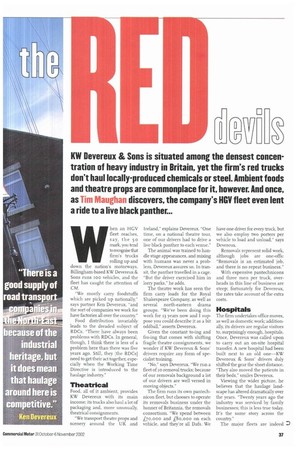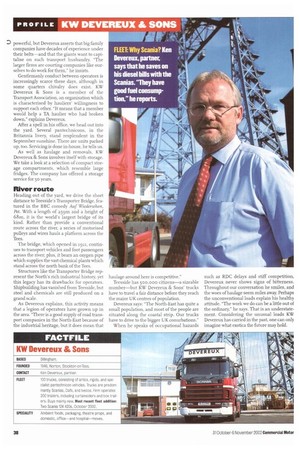KW Devereux & Sons is situated among the densest concentration
Page 37

Page 38

If you've noticed an error in this article please click here to report it so we can fix it.
of heavy industry in Britain, yet the firm's red trucks don't haul locally-produced chemicals or steel. Ambient foods and theatre props are commonplace for it, however. And once,
as discovers, the company's HGV fleet even lent a ride to a live black panther...
When an HGV fleet reaches, say, the 50 mark, you tend to recognise that firm's trucks rolling up and down the nation's motorways. Billingham-based KW Devereux & Sons runs too vehicles, and the fleet has caught the attention of CM.
"We mostly carry foodstuffs which are picked up nationally," says partner Ken Devereux, "and the sort of companies we work for have factories all over the country."
Food distribution invariably leads to the dreaded subject of RDCs. "There have always been problems with RDCs. In general, though, I think there is less of a problem here than there was five years ago. Still, they [the RD Cs] need to get their act together, especially when the Working Time Directive is introduced to the haulage industry."
Theatrical
Food, all of it ambient, provides KW Devereux with its main income; its trucks also haul a lot of packaging and, more unusually, theatrical consignments.
"We transport theatre props and scenery around the UK and Ireland," explains Devereux. "One time, on a national theatre tour, one of our drivers had to drive a live black panther to each venue."
The animal was trained to hanclle stage appearances, and mixing with humans was never a problem, Devereux assures us. In transit, the panther travelled in a cage. "But the driver exercised him in lorry parks," he adds.
The theatre work has seen the firm carry loads for the Royal Shakespeare Company, as well as several north-eastern drama groups. "We've been doing this work for 13 years now and I suppose you could describe it as a bit oddball," asserts Devereux.
Given the constant to-ing and fro-ing that comes with shifting fragile theatre consignments, we wonder if KW Devereux & Sons' drivers require any form of specialist training.
"No," says Devereux. "We run a fleet of to removal trucks; because of our removals background a lot of our drivers are well versed in moving objects."
The firm runs its own pantechnicon fleet, but chooses to operate its removals business under the banner of Britannia, the removals consortium. "We spend between £70,000 and go,000 on each vehicle, and they're all Dafs. We have one driver for every truck, but we also employ two porters per vehicle to load and unload," says Devereux.
Removals represent solid work, although jobs are one-offs: "Removals is an estimated job, and there is no repeat business."
With expensive pantechnicons and three men per truck, overheads in this line of business are steep; fortunately for Devereux, the rates take account of the extra costs.
Hospitals
The firm undertakes office moves, as well as domestic work; additionally, its drivers are regular visitors to, surprisingly enough, hospitals. Once, Devereux was called upon to carry out an on-site hospital transfer. A new hospital had been built next to an old one—KW Devereux & Sons' drivers duly shifted the gear the short distance. "They also moved the patients in their beds," smiles Devereux.
Viewing the wider picture, he believes that the haulage landscape has altered dramatically over the years. "Twenty years ago the industry was serviced by family businesses; this is less true today. It's the same story across the country." The major fleets are indeed 0 P powerful, but Devereux asserts that big family companies have decades of experience under
their belts and that the giants want to capitalise on such transport husbandry. "The larger firms are courting companies like ourselves to do work for them," he insists.
Gentlemanly conduct between operators is increasingly scarce these days, although in some quarters chivalry does exist. KW Devereux 8c. Sons is a member of the Transport Association, an organisation which is characterised by hauliers' willingness to support each other. "It means that a member would help a TA haulier who had broken down," explains Devereux.
After a spell in his office, we head out into the yard. Several pantechnicons, in the Britannia livery, stand resplendent in the September sunshine. There are units parked up, too. Servicing is done in-house, he tells us.
As well as haulage and removals, KW Devereux & Sons involves itself with storage. We take a look at a selection of compact storage compartments, which resemble large fridges. The company has offered a storage service for 50 years.
River rout.
Heading out of the yard, we drive the short distance to Teesside's Transporter Bridge, featured in the BBC comedy Auf Wiedersekten, Pet. With a length of 259m and a height of 68m, it is the world's largest bridge of its kind. Rather than provide a conventional route across the river, a series of motorised pulleys and wires hauls a platform across the Tees.
The bridge, which opened in 1911, continues to transport vehicles and foot passengers across the river; plus, it bears an oxygen pipe which supplies the vast chemical plants which stand across the north bank of the Tees.
Structures like the Transporter Bridge represent the North's rich industrial history, yet this legacy has its drawbacks for operators. Shipbuilding has vanished from Teesside, but steel and chemicals are still produced on a grand scale, As Devereux explains, this activity means that a legion of operators have grown up in the area. "There is a good supply of road transport companies in the North-East because of the industrial heritage, but it does mean that haulage around here is competitive."
Teesside has 5oo,000 citizens—a sizeable number—but KW Devereux 8c Sons' trucks have to travel a fair distance before they reach the major UK centres of population.
Devereux says: "The North-East has quite a small population, and most of the people are situated along the coastal strip. Our trucks have to drive to the bigger UK conurbations."
When he speaks of occupational hazards such as RDC delays and stiff competition, Devereux never shows signs of bitterness. Throughout our conversation he smiles, and the woes of haulage seem miles away. Perhaps the unconventional loads explain his healthy attitude. "The work we do can be a little out of the ordinary," he says. That is an understatement. Considering the unusual loads KW Devereux has carried in the past, one can only imagine what exotica the future may hold.




























































































































































